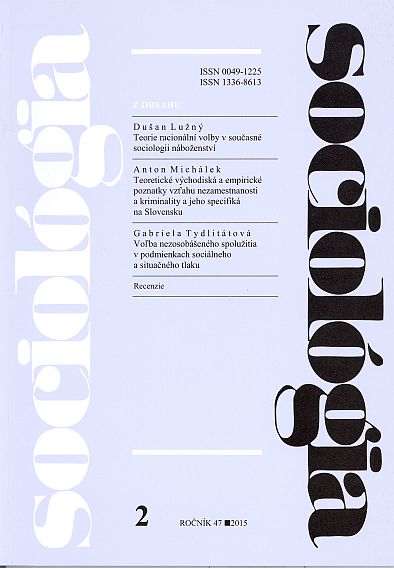Teoretické východiská a empirické poznatky o vzťahu nezamestnanosti a kriminality a jeho špecifiká na Slovensku
Theoretical Basis and Empirical Knowledge of the Relationship Between Unemploy¬ment and Crime and its Specific Features in Slovakia
Author(s): Anton MichálekSubject(s): Social Sciences
Published by: Sociologický ústav - Slovenská akadémia vied
Keywords: crime; unemployment; theory of rational choice; theory of standard activities; theory of anomie; regions of Slovakia
Summary/Abstract: Theoretical Basis and Empirical Knowledge of the Relationship Between Unemploy¬ment and Crime and its Specific Features in Slovakia. The article focuses on a theme that is complex in terms of data, methodology and argumentation. The principal aim is to provide relevant theoretical basis and empirical knowledge about the existence of relationship between unemployment and crime. Other equally important objective is the research and acquisition of knowledge about the above-mentioned relationship in Slovakia while the more detailed analysis of the relationship between unemployment and four selected kinds of crime was given special attention. Based on the knowledge drawn from existing literature and using the Spearman correlation coefficient, dependence between the above-mentioned two phenomena was studied. Regional data of the Crime Statistics in the Slovak Republic for 53 police wards obtained from the Ministry of Interior of the SR and the Regional data about unemployment of the Statistical Office of the SR were used in this analysis. The data were statistically processed and a map providing the picture about spatial distribution of unemployed perpetrators was compiled. Results of the carried out analysis contradict the hypothesis about any significant correlation between unemployment and the studied kinds of crime. The values of correlation coefficients in all cases pointed to a weak and in one case (violent crime) zero correlation. Results and knowledge about the ambivalent relationship between the studied phenomena indicate that in Slovakia the nature of theft or larceny is driven by greed rather than necessity. The identified non-dependence also indicates that the theory of standard activities or that of number of opportunities and life style better explain the studied relationship. From the scientific point of view, the hypothesis about dependence between the studied phenomena that were analysed based on the regional data in Slovakia has not been confirmed. However, further study of the quoted relationships and analysis of longer time intervals and/or inclusion of other kinds of crime is necessary. It is also necessary to interpret the results in the framework of criminological, sociological, economic and other theories. From the point of view of applied sphere it is necessary to identify the common and specific feature and causes in regions that determine the level of crime. Research oriented in this way may provide the necessary information and knowledge for identification of crime determinants in Slovakia and to expand the possibilities of search for causes, conditions and factors of crime in particular regions of Slovakia. Sociológia 2015, Vol. 47 (No. 2: 171-190)
Journal: Sociológia - Slovak Sociological Review
- Issue Year: 47/2015
- Issue No: 2
- Page Range: 171-190
- Page Count: 20

